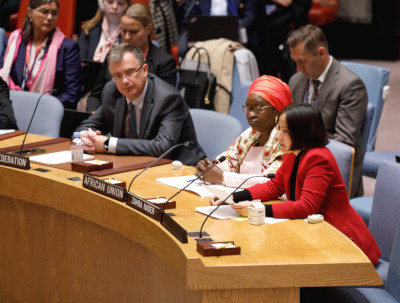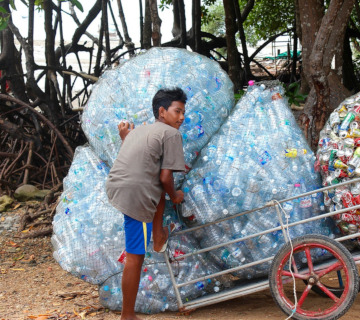
A week ago the first of five United Nations negotiation sessions ended in Punta Del Este, Uruguay. Together these sessions will decide the shape and scope of the upcoming UN International Legally Binding Instrument on plastic pollution. Dr Matthew Peacock argues that the eventual treaty must apply to all nations and hold all accountable if it is to counter a transboundary threat like plastic pollution.
This meeting represents the first stage of a long journey. The members of the International Negotiating Committee have yet to agree on an exact destination for the journey or on the best way to get there, nonetheless the fact that they have agreed to make the journey at all is in itself extraordinary.
In essence, the 160 countries, industry groups, scientists and activists represented all acknowledge that an International Legally Binding Instrument should exist but cannot agree on how international and how legally binding that instrument should be.

Put another way, should the treaty apply in the same way to every country no matter its size or circumstances and should its stipulations be mandatory or should each country have scope to decide for itself which regulations to adopt? On this question two main camps have already formed. In one corner, the High Ambition Coalition to End Plastic Pollution led by Norway and Rwanda and including the UK, Canada, the EU and a number of developed and developing nations, wishes to establish global standards which will apply to all nations and for which all nations will be held accountable. Ranged against them is a small but powerful coalition led by prosperous nations whose governments have close ties to the plastics industry, chiefly the United States and Saudi Arabia, who advocate for National Action Plans (NAPs) by which each individual nation can decide the extent of their own compliance. Opponents have been quick to dub this group the “low ambition coalition”.
Andrés Del Castillo, senior attorney at the Center for International Environmental Law, speaks for many such critics in saying that while he doesn’t dismiss NAPS entirely, any approach which treats them as the mainstay of the instrument misses that plastics are, in essence, a transboundary problem. Moreover, in an Associated Press Article he questions the “point of meeting five times with experts all around the world to discuss voluntary actions, when there are specific control measures that are needed”. Not optimal or desirable, but needed.
Another bone of contention is exactly what the regulations should be regulating. Lobbies with connections to the private sector favour a focus on recycling and management of plastic waste to the exclusion of preventing plastic from becoming waste in the first place by encouraging re-use, repair and more sustainable approaches to design and manufacture.

Environmental groups are increasingly describing this approach as myopic. Arguably it serves only the short term needs of a plastics industry who, though willing to make concessions to the growing pressure to tackle plastic waste, at heart wish only to continue to make plastic. This practice of manufacturing plastic has other negative environmental impacts beyond generating yet more plastic to be disposed of as it both generates atmospheric pollution and drives demand for fossil fuel feedstock. Moreover, the process of recycling plastic goods is itself inefficient, polluting and often hazardous to those involved. Collecting waste for recycling is unhealthy and poorly paid work, transporting waste to recycling hubs devours fossil fuels and generates atmospheric pollution, while recycling itself produces further emissions and typically results in a less valuable product than the original. Recycling, sadly, often means downcycling.
These negotiations, then, are vital, but whilst no two countries are exactly alike in their culpability for plastic pollution or their ability to fight it, plastic waste doesn’t care about national boundaries. A weak treaty which makes it easy for individual nations to opt out of more stringent measures curbing the manufacture, use and disposal of plastic misses the point. No nation can opt out of the terrible cost to human life and the natural environment of continuing to rely on plastic goods. National Action Plans have their place but can so easily be used as a license for avoiding decisive action when it is most needed.
If there was ever a time for half measures, opting out or reliance on National Action Plans it is long past. It’s now time to radically rethink the cultural, economic, legal and pragmatic ramifications of every stage of the plastic cycle. It’s time to go all in on plastics.
“I call on countries to look beyond waste and turn off the tap on plastic” U.N. Secretary-General Antonio Guterres


Very interesting post. I agree that there is room for National Action Plans – indeed they are necessary – but in isolation they will not solve the problem.